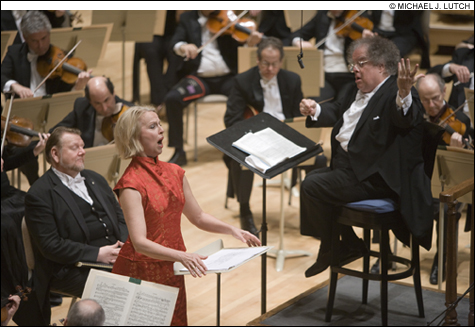
THE VOCAL AFTERLIFE: Anne Sofie von Otter wasn’t an ideal Earth Mother, and Nathan Gunn
gave us monotonous Milosz, but Kate Lindsey embodied Louise Glück’s Eurydice. |
On paper, it seemed like a good idea to pair John Harbison’s big new BSO commission — Symphony No. 5, which incorporates settings of poems about Orpheus by the late Nobel laureate Czeslaw Milosz, Pulitzer-winning former poet laureate Louise Glück, and Rainer Maria Rilke — with Mahler’s late “song-symphony, Das Lied von der Erde (“The Song of the Earth”). It’s a neat package. Each requires two singers, and each deals with large “life questions.” But perhaps music director James Levine underestimated the ambition and the power of the Harbison. In performance, they were less complementary than competitive. After the half-hour-plus Harbison, I didn’t want to deal with an even longer vocal-symphonic work in a similar elegiac vein, even if it is one of my favorite pieces of music and I’ve admired the way Levine has conducted it. The two mezzo-sopranos in these pieces are also singing together in the next BSO program, Berlioz’s epic Trojan War opera, Les Troyens. Was having them appear in two back-to-back concerts the real backstory for this awkward programming?
I found the Harbison thrilling, though (or because) it’s quite an unusual piece. The first movement, about as long as the other two put together, is a setting of Milosz’s “Orpheus and Eurydice,” his personal modernization of the Orpheus myth (in an eloquent English translation he did with Robert Hass). An orchestral prelude begins with a wild upward swing, a heaving cry of grief; then there’s sudden quiet as the baritone intones: “Standing on flagstones at the entrance to Hades.” The vocal setting is a stark recitative, surrounded by a swirl of atmospheric and psychological orchestral responses to the poem. Snarling muted trombones reflect “the headlights of cars [that] flared and dimmed” as Orpheus hesitates at the “glass-panelled door” to the underworld. He remembers Eurydice calling him “a good man” — that shimmering echo is then punctured by the reality that “He did not quite believe it,” because “Lyric poets/Usually have — as he knew — cold hearts./It is like a medical condition./Perfection in art/Is given in exchange for such affliction.”

Orpheus’s lute is here an electric guitar (evocatively played by Boston composer Michael Gandolfi), and the song he sings to win over Persephone is one of Harbison’s (and Milosz’s) most ravishing lyric passages (“He sang of smoking water and rose-colored daybreaks./Of colors: cinnabar, carmine, burnt sienna, blue./Of the delight of swimming in the sea under marble cliffs . . . ”). What god wouldn’t be ravished? But Persephone’s warning that Orpheus may not look back is a staccato injunction that undercuts the lyricism. The return to the world has a mysterious hieratic aura (a giant bell tolling) mixed with the realistic sounds of shuffling footsteps and clanking cowbells (sandpaper and metal blocks).
Milosz — and Harbison — capture the increasing desperation of Orpheus’s doubt (“Unable to weep, he wept at the loss/Of the human hope for the resurrection of the dead,/Because he was, now, like every other mortal . . . /He knew he must have faith, and he could not have faith”), so that when he can no longer bear Eurydice’s silence and turns around, we’re not sure she was ever there. The movement ends in cataclysmic: “Now everything cried to him: Eurydice!”
Because it’s the surrounding orchestra on which Harbison focuses his Technicolor, for the poem to work the baritone must convince us he’s living Milosz’s labyrinthine emotional twists and mercurial turns. Popular Metropolitan Opera hunk Nathan Gunn never entered the world of the words. What should have been piercing was merely monotonous.
Without a pause, this long narrative is answered by Harbison’s glassily eerie and smeary setting of Louise Glück’s “Relic,” in the voice of the dead Eurydice: “Where would I be without my sorrow . . . this song/of all gifts the most lasting?//How would you like to die/while Orpheus was singing?” The muted trumpets at the end of this short movement sound like taps. Young Met mezzo Kate Lindsey, in radiant voice, seemed the embodiment of Glück’s Eurydice.
This leads directly into Rilke’s more hopeful “Be ahead of all parting,” one of his Sonette an Orpheus (in Stephen Mitchell’s translation). I found the vocal duet hard to hear and to absorb. The most remarkable passage is the postlude, an ambiguous and unsettling mixture of celebration and lament, apocalypse and withdrawal, gossamer pianissimo and gamelan-like insistence. It reminded me of the ambiguity of Elizabeth Bishop’s “The art of losing isn’t hard to master,” pitting sorrowful resignation against the ego’s refusal to be defeated by loss. Too bad there were only two Boston performances, but it will be done again July 18 at Tanglewood, coupled with the perhaps more appropriate Mahler Symphony No. 1.